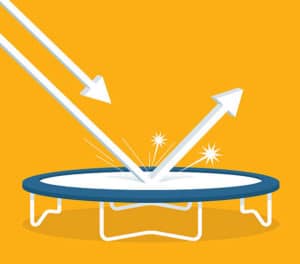The social economy which is positioned between the private and public sectors has lead to the development of social companies such as Groupe Innova (http://www.collectioninnova.com/fr/groupe-innova.aspx). This social company oscillates between an entrepreneurial goal (produces and sells adaptive clothing) and as a professional reintegration goal for individuals having a mental health problem.
In this article, I will explore the path to recovery of six workers employed by Groupe Innova with a mental health problem.
I will also talk about the workers' perceptions of their experience at Groupe Innova.
Therefore, I invite you to discover a few members of our team and the richness of their lives!
The mental health problem
The six workers are now psychically stable but nevertheless had to deal with various mental health disorders: psychotic shock, depression, schizophrenia and anxiety disorder.
Mental health problems have arisen due to a variety of factors: heredity and genetic predispositions, sensitivity to stress, starvation of food, isolation, drug addiction and the context of domestic violence.
Symptoms
During their episodes of distress, the participants experienced a variety of symptoms: ideas of grandeur "I was saving the world", hallucinations "I heard voices" and delusions "My father was visiting me and I told him that he was not my father. " One participant didn't have any psychotic episodes, but she struggles with anxiety on an ongoing basis.

The number of episodes lived varies from one person to another, but the majority lived one or two episodes. The severity of the episodes goes from light to severe.
All the women interviewed take medicationon a regular and long-term basis.
To this day, we can see that residual symptoms vary a lot from one woman to another. While one participant does not have any symptoms, others have to deal with cognitive deficiencies (memory and concentration problems), anxiety, obssessive-compulsive disorder (repeat actions, compulsive behaviours). One participant says that she has paranoid symptoms but they are not intrusive '' I am scared that people don't like me''.
Functional skills
In most of the participants, the mental health problem limits the functional skills, and at various degrees. Thus, a participant emphasizes that her diagnosis restricts her cognitive skills and her divided attention (multi-tasks) and that she is more isolated since her mental health problem. A second participant considers that she has more difficulty to make friends since her illness.
With regards to the work aspect, the mental health problem has significant repercussions for the participants: inability to enter the regular labor market, inability to start a business, long period of unemployment. Other repercussions were cited: low self-esteem, difficulty asserting oneself and difficulty meeting a partner.
Mourning
There is no doubt that having a mental health problem led the participants to grieve: mourning for the regular job market, mourning for having a good relationship with one's family, mourning for memory, mourning for long term travel and mourning for having children. A participant says that she has mourned being a person with a completely free way of life, that is to say a person who does not work and who makes art all day long: “By having schizophrenia, I must have a routine, a job, otherwise I would become ill again. "
When participants were asked what their mental health challenges had taught them about themselves, many mentioned their great strength and their ability to cope with any ordeal. The following statement expresses this idea well: '' If I survived up to now, it's because I am a strong woman''. An other participant realizes that she is a good person and that she is doing enough '' If I had a tatoo, I would like that it says Just enough. ''
Recovery of the participants
Social support
Social support is a crucial factor in the recovery of the participants. It can be supportive parents who believe in them, a peer helper in an organization, social media, their husband, their children, the brothers and sisters, their friends, the neighborhood, meaningful staff at work, all the women who were interviewed needed a social safety net to get over it.
Nevertheless, two of the participants had to distance themselves from certain family members because of great tensions in the family.
The large majority of participants have benefited and continue to benefit from the support of health care providers and professionals. Four participants out of the six consult a psychiatrist, whereas the two others wee a family doctor. Half of the participants have a follow-up with a social worker.
One participant noted the positive contribution of her previous occupational therapy follow-up: “The occupational therapist gave me more self-confidence. She gave me a strategy so I wouldn't want to repeat my actions. "
Another participant mentioned that a nurse was very important in her recovery: “She would pick me up in a room and every night that she was working, we talked to each other. This is where I started to verbalize my problems more.“
Some participants also receive support from people in their home environment.

Community organizations and therapies
The contribution of community organizations in the recovery process of the participants is substancial. For example, one woman interviewed recounts how having taken a step in a self-knowledge center allowed her to get to know herself better, to have the tools to communicate better and to be in a group with people like her.
The participants received help from mental health organizations, from support groups for addictions, from a shelter for abused women as well as a women's center. A participant did several therapies, including cognitive behavioural therapy, an emotions management program and a human relations course.
This last participant testifies that: "The therapies did not teach me to see the glass half full (to always be positive). They didn't teach me to see the glass half empty (being negative), but to see the glass halfway (being positive but allowing yourself to be negative)."
Significant activities:
Taking part in meaningful activities helps participants overcome their mental health problem. This is how writing allows some participants to take a step back from what they are going through: “My diary gives me clues that I may be more fragile.“ For another participant, translating is a meaningful hobby.
Some of the women interviewed mentioned that cooking good meals keeps them in a balanced state: “I mostly recovered through cooking. Ricardo has helped me a lot because his recipes are simple. "
The participants identified the following activities as being particularly helpful: the arts, meditation, the use of technology (tablet, video games, television), listening to comedians, knitting and sewing. To this effect, one participant recounts: “During my internment, I started to sew and my mental health became better. It might sound cliché but sewing clothes really saved me. "
The spirituality:
All the woman interviewed said that spirituality contributed to their recovery. Spirituality makes it possible to reduce worries, to endure suffering and to give meaning to life.
The following quotes demonstrate the importance of spirituality when using mental health services: “I believe there is something above that helps us” or “Spirituality makes me feel good. I am talking to my deceased grandmother. My father painted it and I have the frame in my room with the crucifix. I ask my grandmother to help me. "
Other participants express their beliefs like this: “I don't adhere to a religion as such but I really like to think about spirituality." Or "I pray a lot. I carry my Jesus on me and at home I have a sheet on which it is written that Jesus is the master of my house and that he is my savior." Finally, a participant testifies: "There is a place, the chapel of reparation, where I and my husband go, it's like a way of the cross. When we enter there, we forget all our problems. "
Dreams and aspirations
The dreams of the participants are part of the continuity: "to continue translating the blog, to stay with my host family and to keep my job at Collection Innova until I retire. » Half of the participants express the desire to take a trip to the future. Two participants would like to accomplish projects that would take them outside of their comfort zone: design their clothing line and study at university.
The women interviewed have several strengths that have helped them recover: persistence and determination, creativity, a sense of humor as well as being hard-working, cheerful and outgoing.
The job market
Before being hired by Groupe Innova, the majority of the participants had different jobs, some of them had many jobs. However, job retention has often been of short or medium duration (less than four years). Two of the participants experienced difficulty in working in the regular job market.
An other participant did not work for a long period of time but she participated in different programs which helped her to reintegrate professionally. It should be noted that several participants have called upon l'Arrimage, an employment assistance service, to integrate Groupe Innova.
Groupe Innova
According to the participants, Groupe Innova is a company with an excellent working atmosphere and an atmosphere of empowerment: “Everyone is in a good mood all the time. Before, I had a hard time smiling. Now it's ok. Or "People are great and nice. It’s the best team I’ve ever worked with. People talk to each other, compliment each other, we all have a bit of the same political point of view, a bit on the left. " Another participant agrees, “It’s a really good job. This is the dream job." And another to add "It's a human approach, without competition. We each do our own thing and help each other. "
A place of socialization
Groupe Innova is a place of socialization that allows you to create links and make friends: "I have created links that make me feel important. Not that I feel pretentious, I feel that people care for me. It does not replace a family but here I feel good. I found my place here. "
Develop skills:
It is a business that allows you to develop skills. The following quotes express this idea well: “I work on my manual skills. There is a zen side to cutting threads. " Or " I am becoming a better seamstress. I gain speed. "

Accommodations
As a social enterprise, Groupe Innova implements accommodations and adaptations that take into account the reality of users of mental health services. Thus, the employer does not hesitate to adapt tasks or offer tailor-made positions. A particularly significant accommodation is the fact that there is less pressure than in the regular job market: “This is a place that accepts that I have had a mental illness. If I did another episode, this is a place that would understand. Or "When I first came here and had a hard time learning things, I cried all the time. I was told that I had to take the time to learn. Another participant underlined this flexibility: "I have a free working day, so I take this day to receive my injection or to make commissions. "
Challenges
Groupe Innova is therefore an adapted environment but which at the same time offers challenges depending on the abilities of the workers: "It's online work, it's repetition, but I haven't been doing the same thing for six months. Another participant said, “There is a lot of openness to learning new things. "
Self-confidence
Participants agree that the company helps boost their self-confidence: “Because they [the bosses] trust me, it gives me confidence. Or "The fact that they [the bosses] gave me more and more responsibilities increased my self-confidence. "
Working with colleagues with a mental health problem
The majority of workers are comfortable working with other people with mental health problems: “I find it reassuring to work with other people who have mental health problems, because when you are the only person who has mental health issues, you're kind of left out. Another participant says, “I don't mind. As long as he's not a violent madman. In Haiti, we call it a sweet fool. We like soft fools." Moreover, one woman interviewed expressed that she always has a little fear: "You never know how people will react. I'm afraid someone will fall off balance. I wouldn't know what to do or who to ask for help."
Working conditions
Overall, the participants say they are satisfied with their working conditions. However, salary is an issue that worries one participant: “We earn the minimum wage. It's not a lot when you have a family. I am lucky because we have two salaries that go home. But those who have only one salary, I don't know how they manage to arrive. They must deprive themselves a lot. A second participant would like to be able to work 40 hours a week in order to increase her salary. The fact that there is no health insurance has also been reported.
In conclusion: path to recovery
According to the interviews conducted, it goes without saying that mental illness is causing a stir. In some cases, it causes residual symptoms which limit functional abilities. It requires mourning at a relatively young age. To come out of it, the women interviewed had to deploy a great internal strenght. Certainly, long-term medication contributes to the psychic stability of the participants, but not only this.
The paths of the participants reveal that social support, support from health professionals, community organizations, doing significant activities, spirituality and the use of one's assets also lead to recovery.
One thing is for sure, in order to have a gratifying experience and promote job retention for persons with a mental health problem, it is important to create tolerant workplaces, like Groupe Innova. Environments where there is real social cohesion and which offer a fair balance between challenges and accommodations.
I would like to thank the six participants for their generosity and their openness to reveal themselves in all their vulnerability.

je tiens à dire qu’en cette journée Internationale des Femmes, je trouve ces femmes extraordinairement courageuses et je remercie l’autrice de ce blogue de avoir fait connaître le quotidiens de ces femmes.
I have read so many posts on the topic of the blogger lovers
but this piece of writing is really a good paragraph, keep it up.
Unquestionably believe that which you said. Your favorite justification appeared to be on the web the
simplest thing to be aware of. I say to you, I certainly get annoyed while people consider worries that
they just do not know about. You managed to hit the nail upon the top and defined out the whole thing without having side effect ,
people could take a signal. Will likely be back to get more.
Thanks
Ce blog est extraordinaire. L’éducation est le meilleur moyen pour faire prendre conscience de nos jugements, des injustices…Il permet de remettre en question nos idées préconçues. Ses publications ouvre à l’empathique et montre la réalité de personnes malheureusement très marginalisées.
*empathie